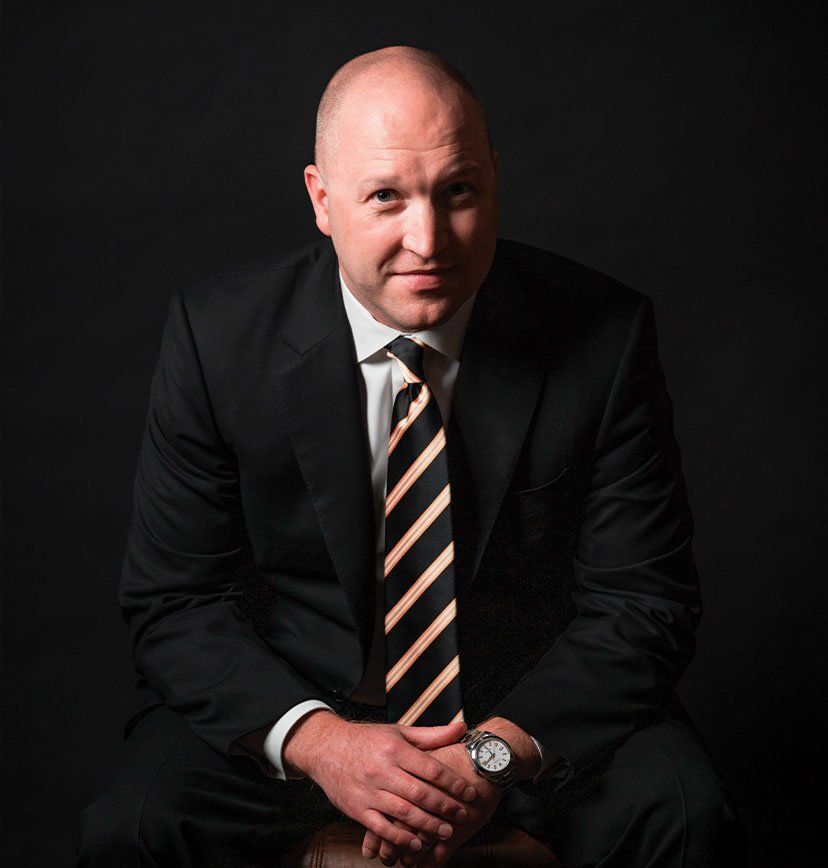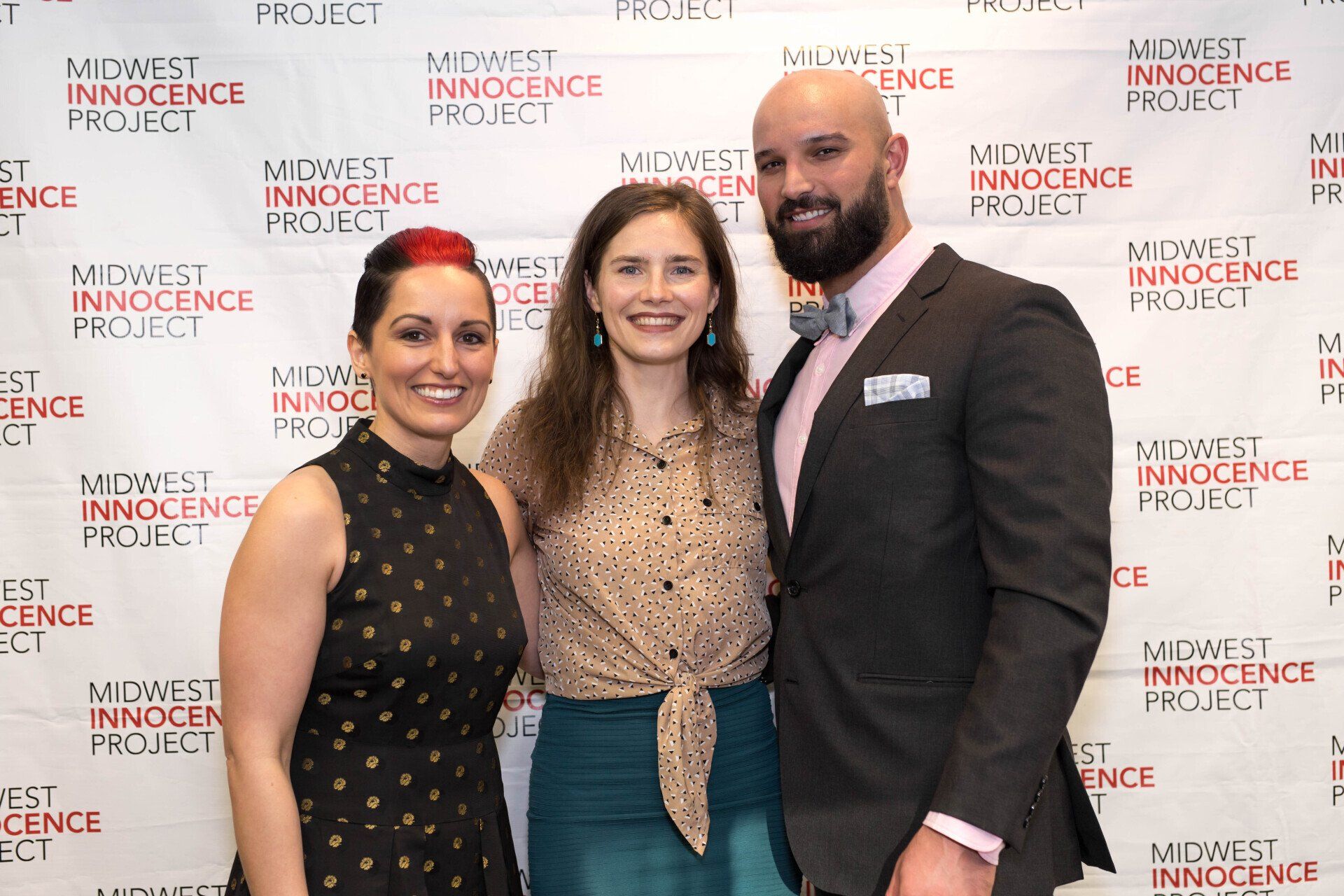No Stone Unturned
Wichita Attorney’s ‘Bulldog’ Work Freed Man Of False Accusations
Written by Amy Palser
Wichita Attorney’s ‘Bulldog’ Work Freed Man Of False Accusations
WRITTEN BY AMY PALSER

Jonathan W. McConnell of McConnell Law Firm

Saber Hossinei at the Midwest Innocence Project gala with keynote speaker Amanda Knox (left) and MIP executive director Tricia Bushnell.

Saber Hossinei with wife Emily

Saber Hossinei with wife Emily
The morning that a SWAT team broke down Saber Hossinei’s door at 5 a.m. and woke him out of a deep sleep, the 30-year-old Wichita man wondered at first if he was dreaming. Even now, seven years later, it sometimes feels like it was all a surreal dream — and yet it’s very real. Without a doubt, it was the moment that changed Saber’s life forever. “It still blows my mind that this happened — from the beginning to the end, I can’t comprehend it,” said Saber.
It was the morning of Jan. 21, 2015, the same day Saber — who grew up in the country outside of Benton with his parents and four siblings — was to start classes at Wichita State University to complete his bachelor’s degree after a 10-year hiatus. In a deep sleep with a couple hours left until his alarm clock would go off, Saber realized that the banging sounds and loud voices that he thought were a dream were actually coming from his living room. “I woke up, and I went downstairs,” he recalled. “I’m going down my spiral staircase in my boxers, and there is an entire SWAT team staring at me. They’re yelling, ‘Come down with your hands up! Hands behind your head!’ They’ve got big shields, they had the helmets, they had the shotguns, their flashlights. They were obviously looking for something.
“They handcuffed me immediately. I said, ‘What’s going on?’ I had no idea why they were there. There are crazy thoughts going through my head: I’m Iranian, I have a very Iranian name, am I being FBI watch-listed? I had no idea what to think.” It was five hours later while sitting face-to-face with an investigator at the police station, that Saber learned why he was there: He was being charged with rape.
“I was shocked. I didn’t know jack about the law but I knew I needed counsel,” Saber said. “When he (the investigator) first told me the charges, I had no idea, I couldn’t even think where they had come from. Until he said, ‘Do you want to tell me about last night?’
That’s when Saber realized the nightmare he was living had actually started the night before.
About Last Night
It was a woman Saber had met on Tinder. Days earlier, they had exchanged phone numbers, made plans to get a drink, canceled them. But on Jan. 20, 2015, the woman texted Saber: “Hey, I’m getting off work early tonight. Do you want to meet up?” Around 7:30 p.m., they met at Mort’s in Wichita, talked and had a round of drinks. They ordered a second round. The woman complained her drink was too strong. Saber casually told her, “Well, don’t drink it then.”
The two decided to leave the bar, so they hopped into her car and drove to Saber’s apartment. They had consensual sex. It was still pretty early, Saber said, so they watched a movie. Before the movie was over, she said she was getting tired, so Saber walked her out to her car, kissed her goodnight, and she left. Saber went to sleep.
The woman did not. Saber would learn later that, after leaving his apartment, she drove to a parking garage and called the police.
Wrongfully Accused
After being booked into jail, Saber’s mind was racing. How could he prove that the encounter he had the night before was consensual? It was certainly irresponsible, he admits, but not illegal. He recalled that his apartment building had surveillance cameras outside. If the cops could just see the tape of him walking the woman to her car, chatting with her, kissing her goodnight, they would see the woman’s story didn’t check out, wouldn’t they?
Meanwhile, Saber’s brother and friends were trying to find an attorney specializing in false accusations. They found criminal defense attorney Jonathan W. McConnell of McConnell Law Firm in Wichita, known for his expert knowledge and unmatched tenacity. A few days after Saber was booked into jail, Jon came to visit him.
“I thought it was going to be a normal meeting with any other potential client where I get to know them, I get their story and I tell them what we need to do and why,” Jon said. “With Saber, it was very unusual — he was so adamant he was innocent. He wanted me to understand that he was innocent, and he wanted me to believe that he was innocent. He made a point to stop me and say, ‘No, no, you don't understand — I didn't do this. I need you to know that.’
“And I realized — this guy’s innocent. This guy didn’t do anything. He wanted someone to fight for him because he was innocent!”
It was the first time Saber heard what was in the police report. The woman claimed he had “tons of guns, cash and drugs” at his apartment — the search showed he did not — which had resulted in the SWAT team breaking down his door at 5 a.m. The woman told police she had gotten up to use the restroom at the bar, and Saber put something in her drink and then forced her to drink it.
Jon quickly realized that the woman had spun a web of lies. And he intended to start proving them wrong, one by one, no matter what it took. “You hear about someone being falsely accused and you’re like, ‘Oh, yeah, OK — well maybe they did something.’ He didn’t do a damn thing — he didn’t. He was in the wrong place at the wrong time with someone that I don't believe was a mentally stable individual. And boom, here we have this case, and it’s crazy.”
Detective Work
One of the first things Jon did was to visit Mort’s and see if they had any cameras. Thankfully for Saber’s case, the bar had a sophisticated surveillance system that showed the woman never left to go to the bathroom, that Saber had never touched her drink and that she was in possession of her drink at all times.
Over the next 11 months, piece by piece, Jon began to dismantle the woman’s story, utilizing private investigators and medical experts and even chasing down anonymous tips to form the defense. Saber knew he had picked the right attorney. “I always looked forward to seeing Jon, to talking with him,” Saber said. “I just felt safe. Like protected almost. I had such an unwavering confidence in his competence. Very early on, I knew he was an absolute bulldog. My brother had called me to tell me about one of the early hearings while I was in jail. He had really done an excellent job to the point my brother said the cops were fist-bumping him after the argument.”
Jon was able to get Saber’s bond reduced, so after 10 days in jail he went home with an ankle monitor, which he wore for the next eight months. “That thing was so stressful because it would just start vibrating like crazy when the battery was dying, and you had 45 minutes to get it plugged in,” Saber recalled. At one point, Saber was on a sales call in a potential customer’s home in western Kansas when the ankle monitor began vibrating; he had 45 minutes to charge it or it would be considered a bond violation. He had to swallow his pride and ask the woman if he could use an outlet to charge his ankle monitor. She was kind and understanding, and Saber was shocked when it ended up being one of his biggest sales.
On July 31, 2015, Jon got a major break in the case when he received an anonymous letter. It contained a printout of a map with a circle drawn around a specific house and a note telling Jon to talk to the home’s residents. “It turned out to be the parents of another sorry guy that she wrongfully accused of doing something to her,” Saber said. “It seemed like every interaction, every investigative action that took place was an adventure.”
In all, Jon found two other men who had been wrongfully accused by the same woman. Both had been exonerated, but the damage from the accusations wreaked havoc on both men’s lives. In one case, the woman’s friend testified that, not only had the woman fabricated the assault, but asked her friend to lie, too.
Another major break in the case came after Jon subpoenaed the woman’s medical records. There were over 2,000 pages that showed she was averaging a trip every other week to the ER to get narcotics — and that was just at one hospital. A toxicologist theorized that her motivation for accusing Saber of rape was to be seen by hospital staff and get a prescription for narcotics.
Free at Last
On Jan. 4, 2016, the day of the trial, Jon and Saber were meeting in Jon’s office to discuss facets of the case when Jon got a phone call from the prosecution.
All charges were being dropped.
“I cried for the first time,” Saber said. “I broke down, hugged him for a bit. I think at that moment I realized how much stress I had internalized, and this relief that washed over me was incredible. I thought we were going to trial, and in my mind I was thinking, I hope the jury is fair, I hope they believe me and they find me innocent. But having experienced racism in my life, there was a little bit of concern. I thought to myself, you went on a Tinder date, and you put yourself in this position, you hooked up, and it was certainly irresponsible. I was just preparing myself.”
While Saber was experiencing waves of relief, Jon was feeling sympathy and regret for this client who had become a friend. “I remember I apologized to him because it had taken so long,” Jon said. “What do you tell somebody who’s falsely accused and had to fight and spend an enormous amount of money for a year — what do you tell them? So I told him I was truly sorry that it took so long, I was truly sorry that the government had brought that case against him. I can never take that away, I can never take that back, I can never take back the days he spent in jail; I can never take back the months that he had the ankle bracelet on. But I could give him this — I could give him that dismissal.”
Living With Purpose
Within two weeks of the charges being dropped, Saber was back in school to finish his bachelor’s degree. And when finals were over, he began volunteering at the Midwest Innocence Project in Kansas City, driving there a couple of evenings a week while working at Chester’s in Wichita. The Innocence Project exonerates the wrongly convicted through DNA testing and other means and works to reform the criminal justice system to prevent future injustice.
Saber didn’t want to consider himself a victim of a wrongful accusation, but he wanted to pay it forward for what Jon had done for him. “Previously the only reason to go back to school was simply just to finish my bachelor’s. There was no end goal,” Saber said. “But then, throughout this experience and learning about the Innocence Project, being inspired by that and being inspired by Jon’s advocacy, I thought, man, there would be true meaning in becoming a lawyer. I would be honored to dedicate my life to that.”
Jon recommended Saber for law school and admission to the bar; Saber graduated from law school in May 2021 and passed the bar two months later. Today, at age 37, he is working as a prosecutor for the Leavenworth County Attorney’s Office. Though his first inclination was to work to exonerate the wrongfully convicted, Saber said the Innocence Project showed him the impact good prosecutors can make. “The prosecutor is the most powerful figure in the criminal justice system. It all starts with them,” he said. “I think that convinced me that working as a prosecutor would be a good way to work on preventing wrong convictions, overcharging issues, and issues of fairness. The legal system is underrepresented by minorities. Bringing that perspective is probably helpful.”
May 2021 also brought another milestone in Saber’s life: He married Emily Reed, a practicing attorney who he met in law school. Jon officiated their wedding.
The arrest, the false accusation, the time in jail and the exoneration changed who Saber was, deep down. “I think I went from living a life of just existing and having a good time and not really taking anything seriously — you know, kind of a man-child — and I grew up. Talking about it with my boss, his comment to me was, ‘This is what made you go from being a boy to becoming a man.’ ”
Saber said Jon was critical to that growth. “He cares so much. Jon’s not my friend, Jon’s my big brother. He’s definitely my big brother.”
SUBSCRIBE TO SPLURGE!
Thank you forsubscribing to Splurge! Magazine
Please try again later.
ADVERTISE WITH SPLURGE!
Send us your contact information & we’ll schedule an appointment with you as soon as possible!
